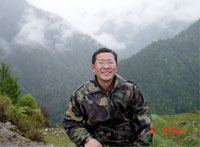
 On October 13th this year, Ma Shaofang, one of the student organizers of the 1989 Tian’anmen hunger strike and now a businessman in Shenzhen, was invited to “tea” by local authorities to warn him of the sensitivity of his plans to attend a writers conference in Beijing during last month’s 17th Party Congress. Ma published the conversation he had with the agents of Ministry of State Security online. CDT translates part of Ma’s account of that conversation:
On October 13th this year, Ma Shaofang, one of the student organizers of the 1989 Tian’anmen hunger strike and now a businessman in Shenzhen, was invited to “tea” by local authorities to warn him of the sensitivity of his plans to attend a writers conference in Beijing during last month’s 17th Party Congress. Ma published the conversation he had with the agents of Ministry of State Security online. CDT translates part of Ma’s account of that conversation:
State Security Agents (State): You must be busy lately? Is the business doing well?
Ma: Enough of this. I heard from the “relevant departments” that people like us are not allowed to make big bucks. We’re just doing enough to make a living.
State: We haven’t bothered your business, have we?
Ma: Really? Unless I remember it wrong, you guys once talked to my partner and said [of me], “If we see him dealing with the company, your business will end.”
State: That’s because you did something we didn’t want you to do. Over the last few years, you didn’t make any trouble for us, so we haven’t made any trouble for you.
Ma: Is that so? You asked me to come over today. Isn’t this trouble?
State: How can you say this is trouble? We’re friends, isn’t it OK to have a cup of tea together?
Ma: It’s a pity we’re not sitting here as friends. Enough beating around the bush, let’s talk about why I am wanted here today.
State: Okay. Are you or are you not planning to go to Beijing in the next few days?
Ma: I am. I’m flying over tomorrow. Any problem?
State: You have to go?
Ma: Yes, a conference related to my business, I’ve got to go.
State: But do you know there’s a meeting in Beijing as well. Can you not go?
Ma: I know, propaganda everyday, how can I not know about the Beijing congress. But does this have anything to do with my business in Beijing? Is there a rule that says citizens cannot go to Beijing around these days?
State: We don’t mean this. Are you going to Beijing just for your business?
Ma: Simply about my business, nobody invited me to go to any non-business meetings. Plus, in times of peace, I believe there’s no such thing as a meeting that threatens the public.
State: Oh, if it’s only for business, then we won’t stop you. We just want to remind you, during special times like this, if you go to attend to your business, that’s fine, but don’t do anything we wouldn’t want you to do.
Ma: What do you mean? What are the things you don’t want me to do? And why is it that I can’t do something simply because you don’t want me to do it? I’m a citizen, and I’m responsible for what I do. If I break the law, then I’ll be punished according to the law.
State: We are just kindly reminding you. If you break the law, of course there are corresponding punishments, and it will surely not be like this, sitting here drinking a cup of tea.
Ma: You mean interrogation. I have gone through that. But what is this reminder, really? A warning, or a threat?
State: We’re friends, and we don’t want our friends to run into trouble.
Ma: But, as I said, we are not sitting here as friends. We are the ruled and the ruler.
State: We don’t think this way.
Ma: It has nothing to do with whether you think so or not. This is a matter of fact, otherwise you wouldn’t be searching me out like this. And as I said over the phone, I don’t have time to beat around the bush. You said if I didn’t accept this invitation, it wouldn’t be good for me.
State: You know well what’s going on. You are smart, and you make money by playing with words (referring to my previous experience doing corporate consultancy), how can you not understand that we are here for your benefit?
Ma: I don’t really understand. Why not say it clearly?
State: Ok, we just hope you don’t invite trouble. Don’t always think that you are always right, criticize this, criticize that. Why can’t you be a “Good Civilian (良民)?”
Ma: “Good Civilian?” This word isn’t appropriate, is it? If I recall, this is the word people used to use during the Japanese occupation period, when the Japanese issued “Good Civilian Certificates (良民证).” Now we have our identification cards, but it doesn’t have a layer of information about “Good Civilianship.” I am sure this word is a wrong one. If I guess right, you must be saying “obedient civilian (顺民)?”
State: Exactly. We don’t care what thoughts you have. But if you act, then there will be legal consequences.
Ma: The law is to punish those who break the law. Did I break the law?
State: We are just reminding you not to.
Ma: Thank you. I will repeat, I am a citizen, and I am responsible for what I do.
State: Then, we will be frank with you. First, this trip to Beijing, be careful and don’t go to places you are not supposed to go to. If you get into trouble, we will be there and it won’t be good for you. Secondly, we heard that you are attending a writers association meeting. This is an illegal organization. You should be careful.
Ma: Not much to say about the first one. A citizen has the freedom to go anywhere he wants. As for the second one, as far as I know, this association is an NGO under the United Nations, a global organization that has a branch in China. As to whether it’s illegal or not, I don’t think it’s up to you to judge. I am not sure of its legality, but if the relevant authorities deem it illegal, then I will make my own correct decision about it.
State: Alright, that’s it for business. Let’s now just chat about some unimportant things. According to your understanding, our political system has problems. Does the US political system have any problems?
Ma: I have never thought that the US political system was perfect, but it is the best system that has been created in human history. Will there be a better system than America’s? Theoretically speaking, it is possible. But I have no idea what it will be like, and I am afraid I cannot prove it theoretically either.
State: But, we still can say, as far as political systems are concerned, both the U.S. and China have problems. Do you agree?
Ma: Yes.
State: Good. Another question: Chinese people, just like people in other countries in the world, can be divided into good people and bad people, right?
Ma: Yes.
State: The U.S. has both good and bad people as well. Right?
Ma: Sure.
State: That’s it. Whether in the U.S. or China, all systems have problems. All people have problems as well. Therefore, the key here is obviously not about the system, but about the problems of people. Therefore, one should not blame this and that problems on the system. Is this right?
Ma: No. You are really confused. [Full Text in Chinese]






